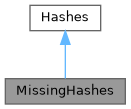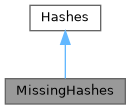Loading...
Searching...
No Matches
MissingHashes Class Reference
Inheritance diagram for MissingHashes:

Collaboration diagram for MissingHashes:

Public Member Functions | |
| None | __init__ (self) |
 Public Member Functions inherited from Hashes Public Member Functions inherited from Hashes | |
| "Hashes" | __and__ (self, "Hashes" other) |
| int | digest_count (self) |
| bool | is_hash_allowed (self, str hash_name, str hex_digest) |
| None | check_against_chunks (self, Iterable[bytes] chunks) |
| None | check_against_file (self, BinaryIO file) |
| None | check_against_path (self, str path) |
| bool | has_one_of (self, Dict[str, str] hashes) |
| bool | __bool__ (self) |
| bool | __eq__ (self, object other) |
| int | __hash__ (self) |
Protected Member Functions | |
| "NoReturn" | _raise (self, Dict[str, "_Hash"] gots) |
Additional Inherited Members | |
 Protected Attributes inherited from Hashes Protected Attributes inherited from Hashes | |
| _allowed | |
Detailed Description
A workalike for Hashes used when we're missing a hash for a requirement It computes the actual hash of the requirement and raises a HashMissing exception showing it to the user.
Constructor & Destructor Documentation
◆ __init__()
| None __init__ | ( | self | ) |
Don't offer the ``hashes`` kwarg.
Reimplemented from Hashes.
Definition at line 144 of file hashes.py.
144 def __init__(self) -> None:
145 """Don't offer the ``hashes`` kwarg."""
146 # Pass our favorite hash in to generate a "gotten hash". With the
147 # empty list, it will never match, so an error will always raise.
148 super().__init__(hashes={FAVORITE_HASH: []})
149
References MissingHashes.__init__(), and i.
Referenced by MissingHashes.__init__(), and Protocol.__init_subclass__().
Here is the call graph for this function:

Here is the caller graph for this function:

Member Function Documentation
◆ _raise()
|
protected |
The documentation for this class was generated from the following file:
- /home/liwuen/projects_dev/pqc-engineering-ssec-23/venv/lib/python3.12/site-packages/pip/_internal/utils/hashes.py
